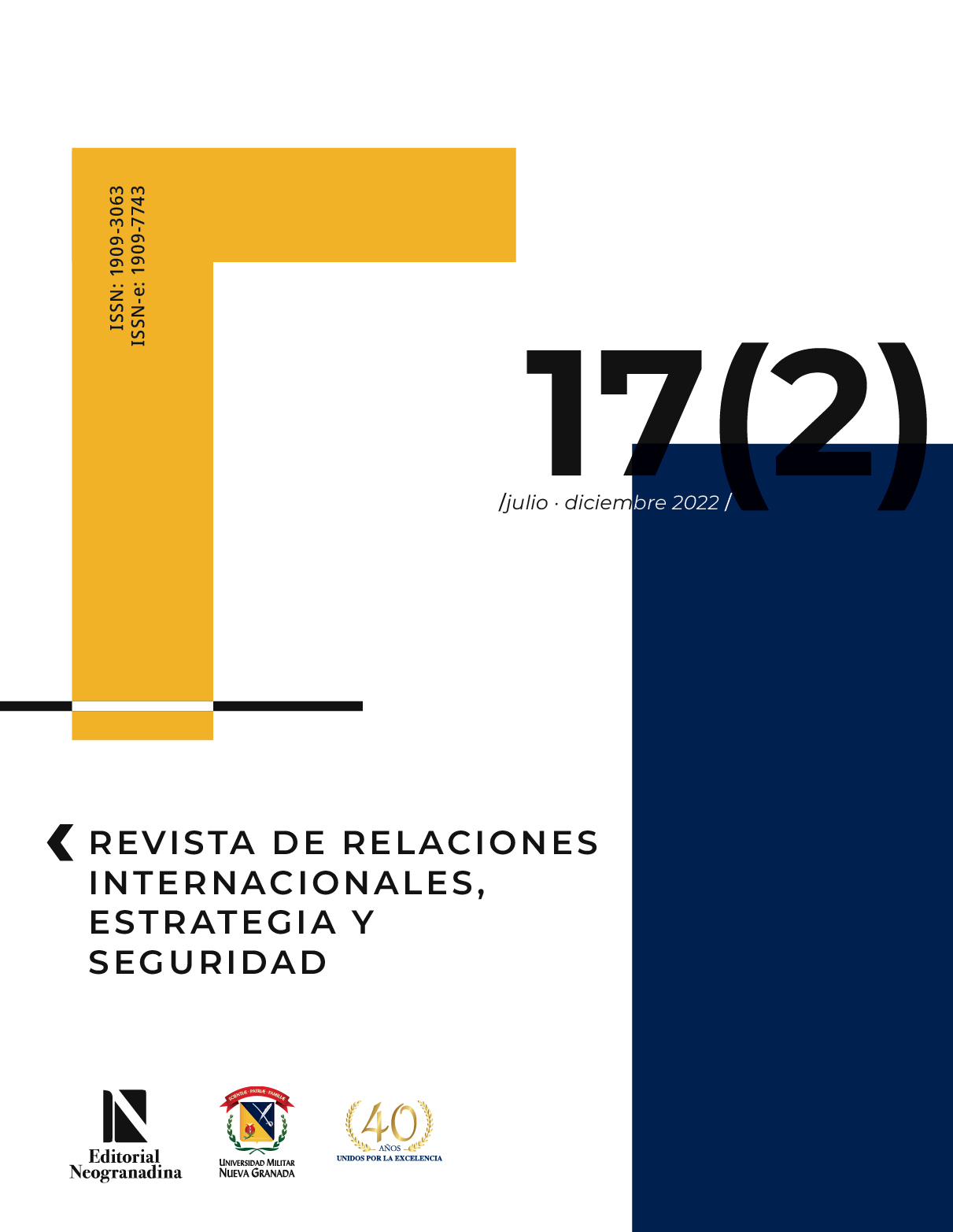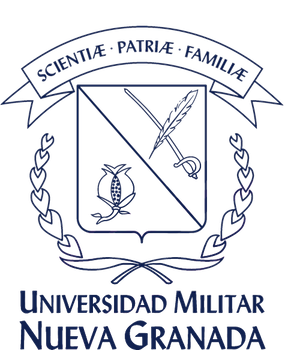Relevancia de Colombia en el Pacífico
análisis de la política de ser potencia bioceánica sostenible para el año 2030
Resumen
El dinamismo del sistema internacional exige al Estado tener una estrategia para asegurar su supervivencia y prosperidad. Muchas veces esta condición no se logra y se crea la percepción que algunos Estados tratan de sobrevivir a las coyunturas que se generan. Colombia, por muchas razones, pertenece a ese grupo. Por eso, cuando en el 2020 se presentó la política de ser potencia bioceánica sostenible para el 2030, se dio una muestra de querer reconfigurar las capacidades a unas más influyentes dentro del ámbito internacional. Sin embargo, su novedad requiere de un análisis para determinar si la estrategia propuesta por el gobierno es viable. Para ello, se realizará primero una línea teórica entre los siguientes pilares: poder, potencia y estrategia; luego, se procederá a relacionar los postulados de la política junto con la teoría; en tercera medida, se analizarán los ejes estratégicos para su ejecución y la comparación entre ambos océanos para determinar si el Pacífico puede ser la clave para lograr la condición de potencia bioceánica; y, finalmente, se terminará con un análisis de los actores del Pacífico que podrían representar una ventaja para Colombia junto con una propuesta para coadyuvar al objetivo de ser potencia bioceánica sostenible para el 2030.
Descargas
Referencias bibliográficas
Albarán Gómez, A. (2019). Poder naval para el desarrollo marítimo de la nación: del realismo a la cooperación internacional. Justicia, 24(35), 13-28. DOI: https://doi.org/10.17081/just.24.35.3385
Altieri, M. (2018). Nuevas Dinámicas del Poder Naval en el Siglo XXI: la competencia por el control en el espacio marítimo. Relaciones Internacionales, 27(55), 197-211. DOI: https://doi.org/10.24215/23142766e047
Ardila, M. (2015). La Alianza del Pacífico y su importancia geoestratégica. Pensamiento Propio, 42, 243-262.
Ardila, M. (2012). Potencia Regional Secundaria en definición: Colombia entre Sur y Centroamérica. Papel Político, 17(1), 293-319.
Bartholomees, J. (2012). Appendix I Guidelines for strategy formulation. En J. Bartholomees, U.S. Army War College Guide to National Security Issues Volume II: National Security Policy and Strategy (pp. 413-418). U. S. Army War College.
Blank, P. (Abril de 1999). The Pacific: A Mediterranean in the Making? Geographical Review, 89(2), 265-277. DOI: https://doi.org/10.1111/j.1931-0846.1999.tb00218.x
Burges, S. (2014). Australia-Latin America Education Relations. En B. Carr, & J. Minns, Australia and Latin America Challenges and Opportunities in the New Millennium (pp. 25-55). Australian National University. DOI: https://doi.org/10.22459/ALA.08.2014
Calduch, R. (1991). Capítulo 7: Las superpotencias, las grandes potencias y las potencias. En Relaciones Internacionales. Madrid: Ediciones Ciencias Sociales.
Chaowsangrat, C. (2018). Historia del comercio interrregional entre países de América Latina y el Caribe y Asia y el Pacífico durante 1990-2012: las perspectivas de Asia Oriental. En E. Pastrana Buelvas, La Alianza del Pacífico: ¿atrapada en el péndulo del regionalismo y del interregionalismo? (pp. 71-110). Opciones Gráficas Editores.
Creus, N. (2013). El concepto de poder en las relaciones internacionales y la necesidad de incorporar nuevos enfoques. Estudios Internacionales, 45(175), 63-78. DOI: https://doi.org/10.5354/0719-3769.2013.27372
Dallanegra, L. (2009). Toma de decisiones y cosntrucción de poder desde el Realismo sistémico estructural. Revista de Relaciones Internacionales de la UNAM, 104, 11-50.
Del Arenal, C. (1983). Poder y Relaciones Internacionales: un análisis conceptual . Estudios Internacionales, 501-524.
Departamento Nacional de Planeación. (31 de Marzo de 2020). Colombia Potencia Bioceánica Sostenible 2030. En Consejo Nacional de Política Económica y Social 3990. Autor.
Drekonja, G. (2011). Formulando la política exterior colombiana. En S. Borda, A. Tickner, & (Compiladoras), Relaciones internacionales y política exterior de colombia, pp. 49-78. DOI: https://doi.org/10.7440/2011.42
Galvis-Aponte, L., Moyano-Támara, L., y Alba-Fajardo, C. (2016). La persistencia de la pobreza en el Pacífico colombiano y sus factores asociados. Banco de la República. DOI: https://doi.org/10.32468/dtseru.238
García-Sanz, D. (2020). China: gran estrategia y poder marítimo en la era de Xi Jinping. Revista Latinoamericana de Estudios de Seguridad, 27, 57-72. DOI: https://doi.org/10.17141/urvio.27.2020.4381
Gómez Alférez, J. (2019). Japan's foreign policy: from imperial power to regional leader? Revista Mundo Asia Pacífico, 8(15), 59-69. doi.org/10.17230/map.v8.i15.04 DOI: https://doi.org/10.17230/map.v8.i15.04
Growl, P. (1991). Alfred Thayer Mahan: El Historiador Naval. En P. Paret, Creadores de la Estrategia Moderna Desde Maquiavelo a la Era Nuclear (pp. 462-495). Ministerio de Defensa de España.
Holland, A. (2016). Las guerras del calentamiento global. Revista Investigación y Ciencia, 479, 34-39.
Hurley, J., Morris, S., y Portelance, G. (2019). Examining the debt implications of the Belt and Road Initiative from a policy perspective. Journal of Infrastructure, Policy and Development, 140-175. DOI: https://doi.org/10.24294/jipd.v3i1.1123
INVEMAR. (23 de Abril de 2018). NVEMAR y la agencia australiana de ciencia y tecnología - csiro- firman memorando de entendimiento y cooperación. http://www.invemar.org.co/-/invemar-y-la-agencia-australiana-de-ciencia-y-tecnologia-csiro-firman-memorando-de-entendimiento-y-cooperacion
Khanna, P. (2017). Conectografía Mapear el futuro de la civilización mundial. Paidós.
Londoño, J. (1966). Nueva geopolítica de Colombia.
Mahan, A. (2004). The Influence of Sea Power Upon History, 1660-1783. A E Warren .
Malena, J. (2019). La evolución de la gran estrategia de China y su impacto en las relaciones con América Latina. Colección, 31(1), 37-52. DOI: https://doi.org/10.46553/colec.31.1.2020.p37-52
Meléndez Camargo, J. (2015). Colombia y su participación en la Guerra de Corea: Una reflexión tras 64 años de inicado el conflicto. Historia y Memoria, 10, 99-239. DOI: https://doi.org/10.19053/20275137.3205
Nye, J. (1990). Soft Power. Foreign Policy, 80, 153-171. DOI: https://doi.org/10.2307/1148580
Pastrana Buelvas, E., y Castro Alegría, R. (2020). Auge y Estancamiento de la Alianza del Pacífico. Análisis Carolina, 1-20. DOI: https://doi.org/10.33960/AC_7.2020
Pastrana, E., Castro, R., y González, P. (2017). Las relaciones entre Colombia y China: perspectivas para una asociación estratégica, comprehensiva e integral. En E. Pastrana, & H. Gehring, La proyección de China en América Latina y el Caribe (pp. 409-445). Pontifica Universidad Javeriana.
Ramírez, K. (2012). Las potencias medias en la teoría de las relaciones internacionales. Nueva Política, 1, 27-50.
Reyes, G. (2019). Alianza del Pacífico: Mercados bursátiles, capacidad institucional y pobreza. Universidad del Rosario.
Rivera-Páez, S., Uribe Cáceres, S., y Rodríguez Ruíz, H. M. (2018). Genealogía de los Intereses Marítimos. En S. Rivera-Páez, Intereses de Colombia en el Mar Reflexiones y Propuestas para la Construcción del País Marítimo (pp. 21-41). Escuela Superior de Guerra. DOI: https://doi.org/10.25062/9789585652873.01
Tickner, A. (2007). Intervención por invitación: Claves de la política exterior colombiana y de sus debilidades principales. Colombia Iternacional, 90-111. DOI: https://doi.org/10.7440/colombiaint65.2007.04

Derechos de autor 2022 Revista de Relaciones Internacionales, Estrategia y Seguridad

Esta obra está bajo una licencia internacional Creative Commons Atribución-NoComercial-SinDerivadas 4.0.











